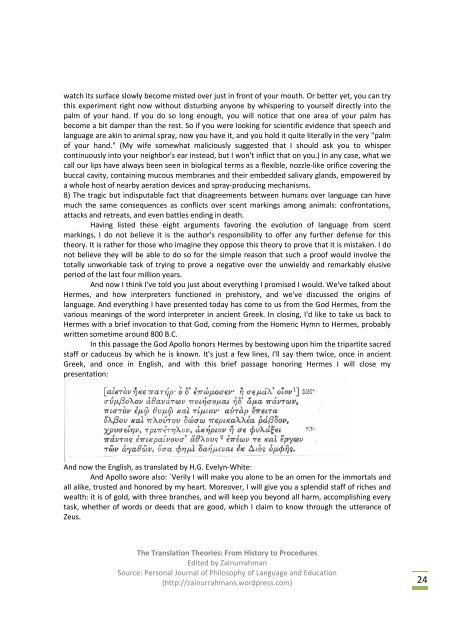Translation Theories.pdf
Translation Theories.pdf
Translation Theories.pdf
You also want an ePaper? Increase the reach of your titles
YUMPU automatically turns print PDFs into web optimized ePapers that Google loves.
watch its surface slowly become misted over just in front of your mouth. Or better yet, you can try<br />
this experiment right now without disturbing anyone by whispering to yourself directly into the<br />
palm of your hand. If you do so long enough, you will notice that one area of your palm has<br />
become a bit damper than the rest. So if you were looking for scientific evidence that speech and<br />
language are akin to animal spray, now you have it, and you hold it quite literally in the very "palm<br />
of your hand." (My wife somewhat maliciously suggested that I should ask you to whisper<br />
continuously into your neighbor's ear instead, but I won't inflict that on you.) In any case, what we<br />
call our lips have always been seen in biological terms as a flexible, nozzle-like orifice covering the<br />
buccal cavity, containing mucous membranes and their embedded salivary glands, empowered by<br />
a whole host of nearby aeration devices and spray-producing mechanisms.<br />
8) The tragic but indisputable fact that disagreements between humans over language can have<br />
much the same consequences as conflicts over scent markings among animals: confrontations,<br />
attacks and retreats, and even battles ending in death.<br />
Having listed these eight arguments favoring the evolution of language from scent<br />
markings, I do not believe it is the author's responsibility to offer any further defense for this<br />
theory. It is rather for those who imagine they oppose this theory to prove that it is mistaken. I do<br />
not believe they will be able to do so for the simple reason that such a proof would involve the<br />
totally unworkable task of trying to prove a negative over the unwieldy and remarkably elusive<br />
period of the last four million years.<br />
And now I think I've told you just about everything I promised I would. We've talked about<br />
Hermes, and how interpreters functioned in prehistory, and we've discussed the origins of<br />
language. And everything I have presented today has come to us from the God Hermes, from the<br />
various meanings of the word interpreter in ancient Greek. In closing, I'd like to take us back to<br />
Hermes with a brief invocation to that God, coming from the Homeric Hymn to Hermes, probably<br />
written sometime around 800 B.C.<br />
In this passage the God Apollo honors Hermes by bestowing upon him the tripartite sacred<br />
staff or caduceus by which he is known. It's just a few lines, I'll say them twice, once in ancient<br />
Greek, and once in English, and with this brief passage honoring Hermes I will close my<br />
presentation:<br />
And now the English, as translated by H.G. Evelyn-White:<br />
And Apollo swore also: `Verily I will make you alone to be an omen for the immortals and<br />
all alike, trusted and honored by my heart. Moreover, I will give you a splendid staff of riches and<br />
wealth: it is of gold, with three branches, and will keep you beyond all harm, accomplishing every<br />
task, whether of words or deeds that are good, which I claim to know through the utterance of<br />
Zeus.<br />
The <strong>Translation</strong> <strong>Theories</strong>: From History to Procedures<br />
Edited by Zainurrahman<br />
Source: Personal Journal of Philosophy of Language and Education<br />
(http://zainurrahmans.wordpress.com) 24

















